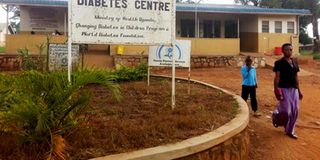Rising cases of lifestyle diseases worry Wakiso health workers

Treatment. A signpost for a non-communicable diseases clinic at Wakiso Health Centre IV. The clinic is one of the centres that handle diabetes. PHOTO BYJAMES KABENGWA
What you need to know:
Dr Mbonye says they expect to receive the first consignment of drugs from Novartis before the end of this year.
WAKISO. The prevalence of non-communicable diseases (NCDs), which are increasingly becoming common due to unhealthy lifestyles in the country, is worrying health workers in Wakiso District.
NCDs, also known as chronic or lifestyle diseases, are those that are not easily transferable from one person to another either through direct contact or by vectors.
These include; diabetes, sickle cell anaemia, cancers, cardiovascular diseases (like heart attacks and strokes), chronic respiratory diseases (such as chronic obstructed pulmonary disease and asthma).
According to Mr Ismael Kagolo, the officer-in-charge of the NCDs clinic at Wakiso Health Centre IV, hypertension or diabetes cases are common yet it wasn’t the case in the district a decade ago.
“What we have observed is that many people don’t know that they have high blood pressure until they get a stroke or a heart attack and this can be blamed on people’s reluctance to seriously take regular medical check-ups,” Mr Kagolo says.
Statistics from Wakiso NCDs clinic indicate that the district has registered 8,200 patients with diabetes up from 6,621 in 2012.
Patients with hypertension increased to 23,654 up from 15,098 in July 2012. Meanwhile, the district that didn’t have patients with ischemic heart disease and cardiovascular disease five years ago, currently attends to 123 and 369 patients respectively.
He says the district has been working with the World Diabetes Foundation since 2007, when a special diabetes clinic was set up.
Ministry of Health records show that 25 per cent of Ugandans die from NCDs and the proportion is increasing every year.
Diabetes is a condition when the sugar levels in blood and urine are higher than normal due to failure by the pancreas to produce adequate insulin to break down the carbohydrates (energy giving foods).
Diabetes presents itself in two forms: Type 1 which is insulin-based and Type 2, which can be relieved with drugs. Type 1 mostly affects children and they grow up with it untill they die, while Type 2 presents in adults, according to Mr Kagolo.
He adds that management of diabetes among children is quite difficult as they would need to apply insulin through an injection that is administered at least four times a day.
But Mr Kagolo says they have so far trained 33 child patients who currently receive treatment at the NCDs clinic through health camps and at the health centre where they visit every Tuesday for reviews.
“To manage diabetes, especially among children, at least Shs340, 000 is needed per month to manage the insulin based (Type 1) diabetes which affects children, but the cost is less than 100,000 among adults.
A child suffering from diabetes gets symptoms, including loss of weight, regular thirst, fevers, swing moods, failure to develop growth milestones and frequent urination,” he says.
Mr Kagolo says a patient with diabetes should undertake regular exercises and consume a lot of dark green vegetables.
“Once sugar levels are low, we advise patients to take sodas, fruit juices and sweets but all these are a taboo when sugar levels are normal,” Mr Kasolo explained. The district has two centres that handle diabetes: At the Wakiso Health Centre IV and Entebbe hospital. Among the 8,200 adult patients recorded in the district, 130 also suffer from hypertension.
“We know there are many people out there with hypertension and diabetes, but they do not know because they have not gone for medical check-up,” says Dr Mathias Sseviiri, the Wakiso District acting director of health services.
Recently, Dr Anthony Mbonye, the director general of health services at the Ministry of Health, said although NCDs are on the rise, infectious diseases such as HIV/Aids, malaria and meningitis are still the biggest killers of Ugandans.
Available statistics indicate that nearly a quarter of Uganda’s adult population has raised blood pressure. However, more than 75 per cent of these people don’t know they have a problem, and are not on medication to control their hypertension.
Dr Mbonye blames the rising cases of NCDs on the growing urbanisation and economic development in the country.
“These chronic diseases such as hypertension, cancer and diabetes are associated with the poor lifestyles many people adopt when they move to the city. The population is increasingly eating unhealthy, not exercising, smoking tobacco and abusing alcohol. Many are unaware that this type of lifestyle is storing up future health problems for them,” he says.
Ray of hope
Dr Mbonye says government has signed a Memorandum of Understanding with the multinational healthcare company, Novartis, to help the county build capacity to diagnose and care for people with NCDs.
He says the MoU will also increase the availability of affordable treatment.
“The agreement with Novartis means that Uganda will become the fourth country in Africa to roll out Novartis Access. The programme offers a basket of 15 generic and patented medicines to address cardiovascular diseases, diabetes, respiratory illnesses, and breast cancer,” he says.
All the 15 treatments in the basket will cost the public sector only $1 (Shs3, 500) per treatment per month, according to Dr Mbonye.
“The government is committed to making these medicines available free of charge to patients in public health facilities. Products will also be available through the Uganda Muslim, Protestant and Catholic Medical bureaus where patients are expected to pay not more than $1.60 (about Shs6,000 ) per treatment per month,” he says.
Dr Mbonye says they expect to receive the first consignment of drugs from Novartis before the end of this year.
“Novartis Access will also support capacity-building activities toward NCD prevention, diagnosis and treatment,” he says.




